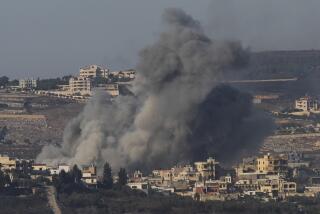Sidon’s Story: Reunion and an Abduction
SIDON, Lebanon — Within the space of five minutes Sunday afternoon, two dramas charged with emotion unfolded on the same dirty street corner of a neighborhood in Sidon.
One appeared sinister and one was joyous, but each reflected the vicissitudes of life in this seaport on the day after the Israeli army withdrew from the town.
The two men involved probably never met, but their fates were intertwined by their relationship with the Israeli forces that occupied the city for the last 2 1/2 years.
The first incident began when a lime-green Mercedes-Benz pulled up to a shabby apartment building in the Villette neighborhood and disgorged four gunmen, two of whom carried submachine guns and a third who bounced a hand grenade in his palm as if it were a baseball.
Man Taken Captive
The gunmen went into the building and emerged several minutes later leading a thin-haired man who wore only a pair of baby blue pajamas. Although it was well past noon, the man had obviously been asleep.
The captive was pushed into the back seat, but after some shouting in the car, he was pulled outside and forced into the trunk. The car carrying the gunmen and the man in blue pajamas then sped off.
A neighbor explained that the abducted man was Capt. Mahmoud Habli, who had been a prominent member of an Israeli-trained militia known as the National Guard.
Various militia groups in Sidon had announced before the Israelis’ departure Saturday that all Israeli “collaborators” were required to turn themselves in.
There have been reports that several collaborators have been killed and others rounded up. Habli was the third member of the National Guard believed to have been abducted this weekend.
As his neighbors watched approvingly, Habli was pulled from his second-floor apartment and driven off to face what seemed like certain death for helping the Israelis during their occupation of Sidon.
Habli’s wife said he had attempted to turn himself in Saturday, but the heavy traffic that resulted from the wild celebrations in Sidon after being freed from Israeli control had caused Habli to wait.
‘We Want No Trouble’
It may have been shock, but oddly none of Habli’s relatives seemed particularly upset at his disappearance. One man smiled wanly to a reporter and said in English: “No trouble. We want no trouble.”
Almost as soon as Habli and his abductors had disappeared around a corner, another car pulled up outside the butcher shop where a small knot of men pass the day watching traffic roll by.
From this car, a more austere Japanese make, emerged Sheik Wafik Ruass, a Sunni Muslim religious leader who had been expelled from Sidon in May, 1983, for activities in the anti-Israeli resistance.
Ruass, nattily attired in a brown suit and matching sweater, was making his first appearance before his congregation in nearly two years, and he is clearly a popular figure in the Sunni Muslim neighborhood.
Receives Rousing Welcome
People began shouting joyously from their windows as soon as he stepped from the car that had brought him from Beirut.
Ruass said the nature of his role in the resistance against the Israelis would remain a secret until the Israelis had left the country entirely. On Saturday, they withdrew only to the Litani River, about 17 miles to the south.
Ruass said, however, that he believes “every Muslim is a member of the resistance.”
The sheik said that about 400 of the Muslim religious leaders in Sidon had been forced to leave the city by the Israelis because of suspicion that they were aiding the resistance fighters who waged a guerrilla war against Israeli soldiers for the last two years.
When asked about the incident involving Habli, Ruass hesitated before answering. Then he said, philosophically, “We are with those who are against the Israelis, and against those who are with the Israelis.”
Celebration Continues
Meanwhile, Sidon continued to celebrate its new-found freedom from the Israeli army as politicians poured into the city to praise its “deliverance.”
President Amin Gemayel arrived by helicopter and was joined by Premier Rashid Karami and a number of other prominent Lebanese.
Gemayel has been causing raised eyebrows in the last two days by outspokenly praising the resistance movement against the Israeli army.
Gemayel’s family and Falangist Party have long had a close relationship with Israel. In addition, the resistance movement has largely been in the hands of Muslim guerrillas. Gemayel is a Christian.
Gemayel told a gathering in Sidon on Sunday that the departure of the Israelis “should cover all territory to include our land which has been irrigated through the honest Lebanese resistance, which has raised Lebanese dignity and has become a symbol of the liberation of Lebanon.”
More to Read
Sign up for Essential California
The most important California stories and recommendations in your inbox every morning.
You may occasionally receive promotional content from the Los Angeles Times.










